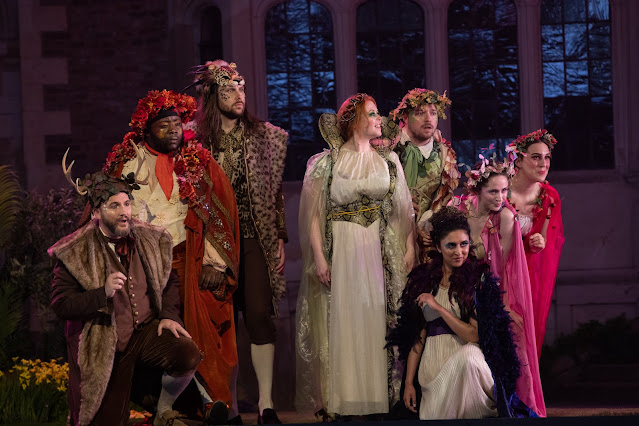 |
| Handel: Acis and Galatea – chorus – Opera Holland Park (Photo: Ali Wright) |
Handel: Acis and Galatea; Elizabeth Karani, Anthony Gregory, Chuma Sijeqa, Ruari Bowen, director: Louise Bakker, City of London Sinfonia, conductor: Michael Papadopoulos; Opera Holland Park
Reviewed 19 July 2024
For the company’s first Handel work, a group of stylishly appealing soloists feature in a production which does not quite understand that less is more and which tends to over-egg things
For such a simple-seeming work, Handel’s Acis and Galatea has a somewhat complex history. Written in 1718 whilst Handel was under the patronage of the Duke of Chandos, the work was premiered at the Duke’s mansion Cannons with a tradition that it took place in the gardens (which were in the process of being ‘improved’), then going on to have a strange after-life as Handel expanded it to suit his Italian opera company.
We don’t know much about that first performance and the surviving music is from slightly later and was published in 1722. It would have been a tiny performance, just five singers providing soloists and chorus, and a similar number of instrumentalists. Whether it was staged is anybody’s guess, but Handel’s complex writing for the chorus suggests that they, at least, would have been stationary.
For Opera Holland Park‘s first production of a Handel work, the choice fell rather aptly on Acis and Galatea in the 1718 version (albeit without the character of Coridon who was in the very first performance but dropped subsequently). We caught the opening night on 19 July 2024, directed by Louise Bakker with Michael Papadopoulos conducting the City of London Sinfonia. Elizabeth Karani was Galatea and Anthony Gregory was Acis, with Chuma Sijeqa as Polyphemus and Ruari Bowen as Damon, plus a chorus of eight.
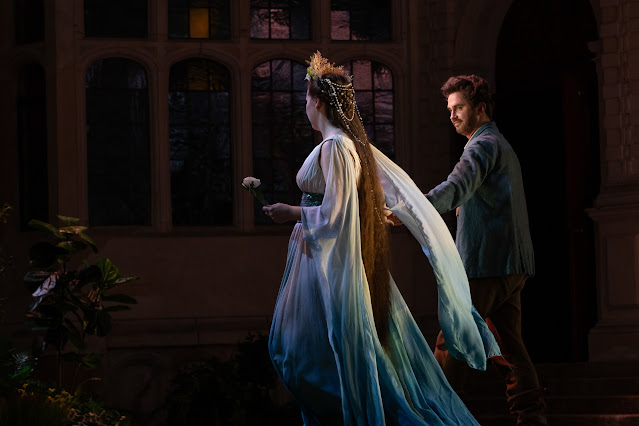 |
| Handel: Acis and Galatea – Elizabeth Karani, Anthony Gregory – Opera Holland Park (Photo: Ali Wright) |
Alyson Cummins’ set spread across the whole of the Opera Holland Park stage, creating a series of pastoral-inspired areas – a temple, a swing in a bower, a mound – with neo-classical architecture and verdant greenery and flowers. And yet, the effect had a deliberate artificiality to it, there was no attempt at realism. This was not an evocation of pastoral Ancient Greece, but a highly theatrical Arcadia. This was emphasised when, during the overture, the chorus arrived. They were dressed in what suggested a group of 18th century aristocrats playing at being English nature spirits. One of the men was Herne the Hunter, another something like the Green Man.
I am a great believer in opera (and theatre productions) standing on their own feet, a performance should not require an explanation. But here, some explanation would have helped. The theatrical presentation gave no hint of what was intended, we were on our own and whilst I think many in the audience found the production charming, for me it had an artificiality which sat uneasily with Handel’s music.
The treatment of the chorus contributed to this. Merry Holden’s choreography was a significant part of the production, from the opening notes of the overture the eight members of the chorus were dancing away. I have nothing but admiration for their hard work, some of the more complex choruses were highly choreographed (perhaps too much) and almost certainly not intended to be combined with such busy movement. And for the first Act, where admittedly not a lot happens, the chorus was ubiquitous, even playing sheep for Anthony Gregory’s first entrance as Acis. Though their presenting of paper birds during Galatea’s ‘Hush, ye pretty warbling quire!’ was a nice touch.
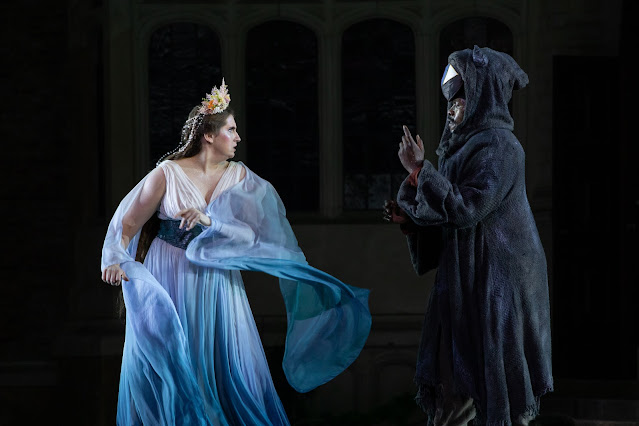 |
| Handel: Acis and Galatea – Elizabeth Karani, Chuma Sijeqa – Opera Holland Park (Photo: Ali Wright) |
The whole of the first act felt as if Bakker did not quite trust the piece and was also worried at filling the wide spaces of the theatre, so what we had was a performance that was constantly on the move, where solos from Karani and Gregory were disturbed by movement from the chorus and where there were lots of jokes. Instead of taking the brave plunge and, say, staging the majority of the piece on fore-stage, Bakker used the full stage and made us aware of any shortcomings thanks to the feverish activity.
Things improved in Act Two, for a start there is more plot. Here the relentless activity from the chorus rather ceased, and the final transformation of Acis into a stream was completely magical.
Elizabeth Karani made an elegant and dignified Galatea, no flirty nymph she, and there were moments when it felt as if Karani was channelling Dido – how about that for a double bill! Karani, who was Musetta in La Boheme here last year, made a musically stylish Galatea, filling out Handel’s vocal line as it needed to be in this space, yet never pushing the music into something period inappropriate. Always a stylish singer, Anthony Gregory was a similarly elegant Acis, filling the space yet giving us a wonderful sense of line and engaging phrasing. If Karani’s Galatea was dressed in a rather regal neo-classical gown (complete with floral tiara), Gregory’s shepherd was dressed in a style which evoked, to me, early 20th century bohemianism and frankly if he’d appeared in public in the outfit, no-one would have batted and eyelid. The two singers made an engaging and balanced pairing, and much of the enjoyment from the evening came from hearing what they did with Handel’s music. Their duets was most appealing, and the opera’s ending was completely touching.
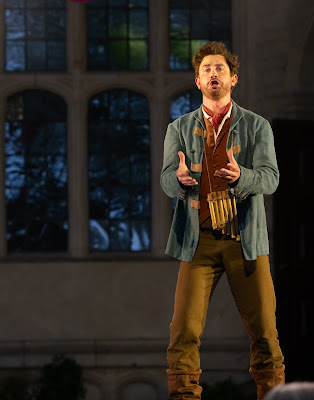 |
| Handel: Acis and Galatea – Anthony Gregory Opera Holland Park (Photo: Ali Wright) |
Ruari Bowen, looking completely unrecognisable with long hair and a huge beard, sang Damon’s two arias elegantly. Damon is the voice of reason, which means that in this sort of opera, his interruptions can be tedious, but here Bowen made everything engaging.
Chuma Sijeqa was not the funniest Polyphemus that I have seen, but like the best comedy, Sijeqa took his character seriously and allowed us to be amused at the idea of the ungainly giant being a lovesick fool. ‘O ruddier than the cherry’ was a delight, rugged and unlikely, and throughout Sijeqa manage to make Polyphemus threatening without taking the drama into another realm.
The small chorus were, as I have said, vividly hard working in the face of the unrelenting energy needed by the constant movement. Unfortunately, in the more complex choruses in Act One and the opening of Act Two, the needs of movement conflicted with good musical order and conductor Michael Papadopoulos was unable to keep things together. This is something that, hopefully, will bed down but unfortunately the musical aspect of these choruses is one of the major parts of the opera so that it is highly noticeable when things go awry.
Featuring more musicians than Handel would probably have had at the premiere, but still the smallest band I have seen at Opera Holland Park in a long time, City of London Sinfonia fielded 16 musicians including Paula Chateauneuf on theorbo and Ashok Gupta on harpsichord. Their approach to the music was very engaging, giving it enough welly to fill the auditorium yet never feeling over-blown. This was playing that still had an intelligent period-appropriateness to it, and to my surprise the continuo featuring cello, theorbo and harpsichord was stronger than I had anticipated.
Michael Papadopoulos clearly has great love for the music and there was much to enjoy in his performance with City of London Sinfonia, so it was only unfortunate that his traffic policeman role in the choruses was an issue.
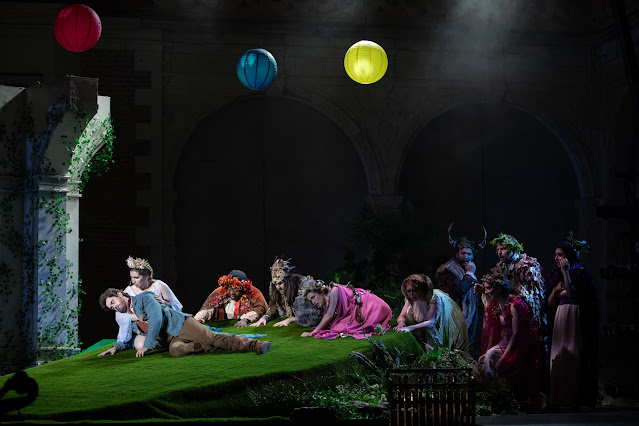 |
| Handel: Acis and Galatea – Anthony Gregory, Elizabeth Karani – Opera Holland Park (Photo: Ali Wright) |
I warmed more to the performance in Act Two, and Bakker’s direction here seemed to do less pulling focus from the soloists, but overall I wished that her treatment of the opera had been a little more neo-classical and a little less relentlessly entertaining. It was for the musical values, notably the soloists and the orchestra, that I really valued this performance. But I seem to have been in a minority when it came to my appreciation of the production as a whole, I heard the presentation called charming and the response from the audience was overwhelmingly positive.
Never miss out on future posts by following us
The blog is free, but I’d be delighted if you were to show your appreciation by buying me a coffee.
Elsewhere on this blog
- Contemporary contrasts: Wolf-Ferrari’s Il segreto di Susanna & Leoncavallo’s Pagliacci in a satisfying double bill at Opera Holland Park – opera review
- A sound world that is distinctive, appealing & engaging: Maria Faust’s Mass of Mary on Estonian Record Productions – record review
- A rich sophistication of thought running through this programme that seems worlds away from the typical debut recital: Awakenings from Laurence Kilsby & Ella O’Neill – record review
- Fine singing and vivid character: a revival of John Cox’s vintage production of Mozart’s Le nozze di Figaro at Garsington – opera review
- An intuitive abstract Sudoku working with sound parameters and with no single solution: Chilean composer Aníbal Vidal on writing music – interview
- Youth, experience and a warm reception: our visit to the Glasperlenspiel Festival in Tartu, Estonia – concert review
- Sustainable Opera for the Future by Max Parfitt of Wild Arts – guest article
- As vivid and vigorous as ever: David McVicar’s production of Handel’s Giulio Cesare returns to Glyndebourne with a terrific young cast – opera review
- Expressionism and rigour: soprano Claire Booth on recording Pierrot Lunaire and the importance of exploring Schoenberg’s songs – interview
- Something of a minor revelation: choral music by Giovanni Bononcini who was brought to England as Handel’s operatic rival – record review
- Pierrot Lunaire, Curlew River and a visit from the Hallé Orchestra: closing weekend of the 75th Aldeburgh Festival – concert review
- Home


%20Ali%20Wright.jpg?w=998&resize=998,665&ssl=1)
.jpg?w=670&resize=670,446&ssl=1)





